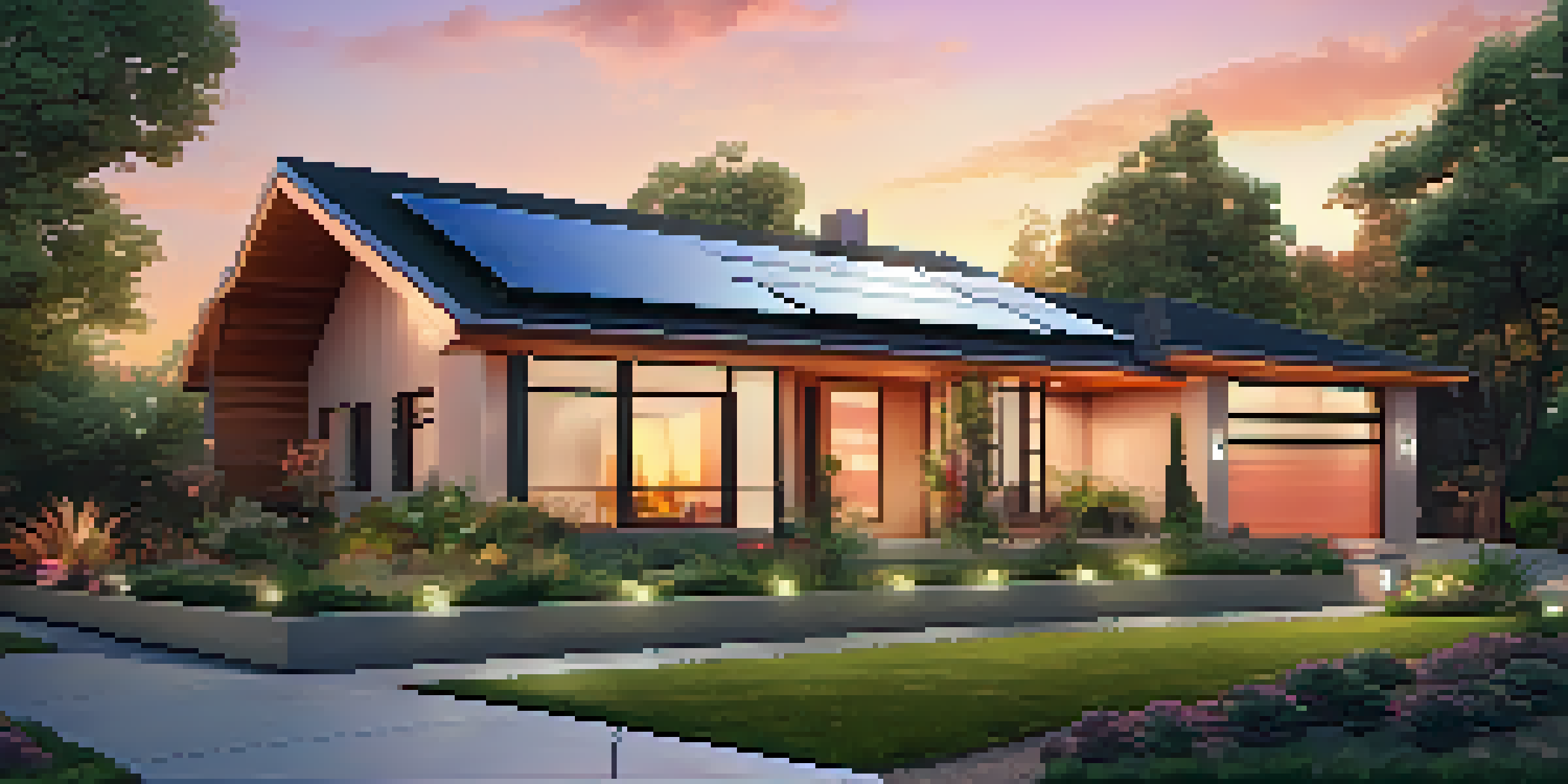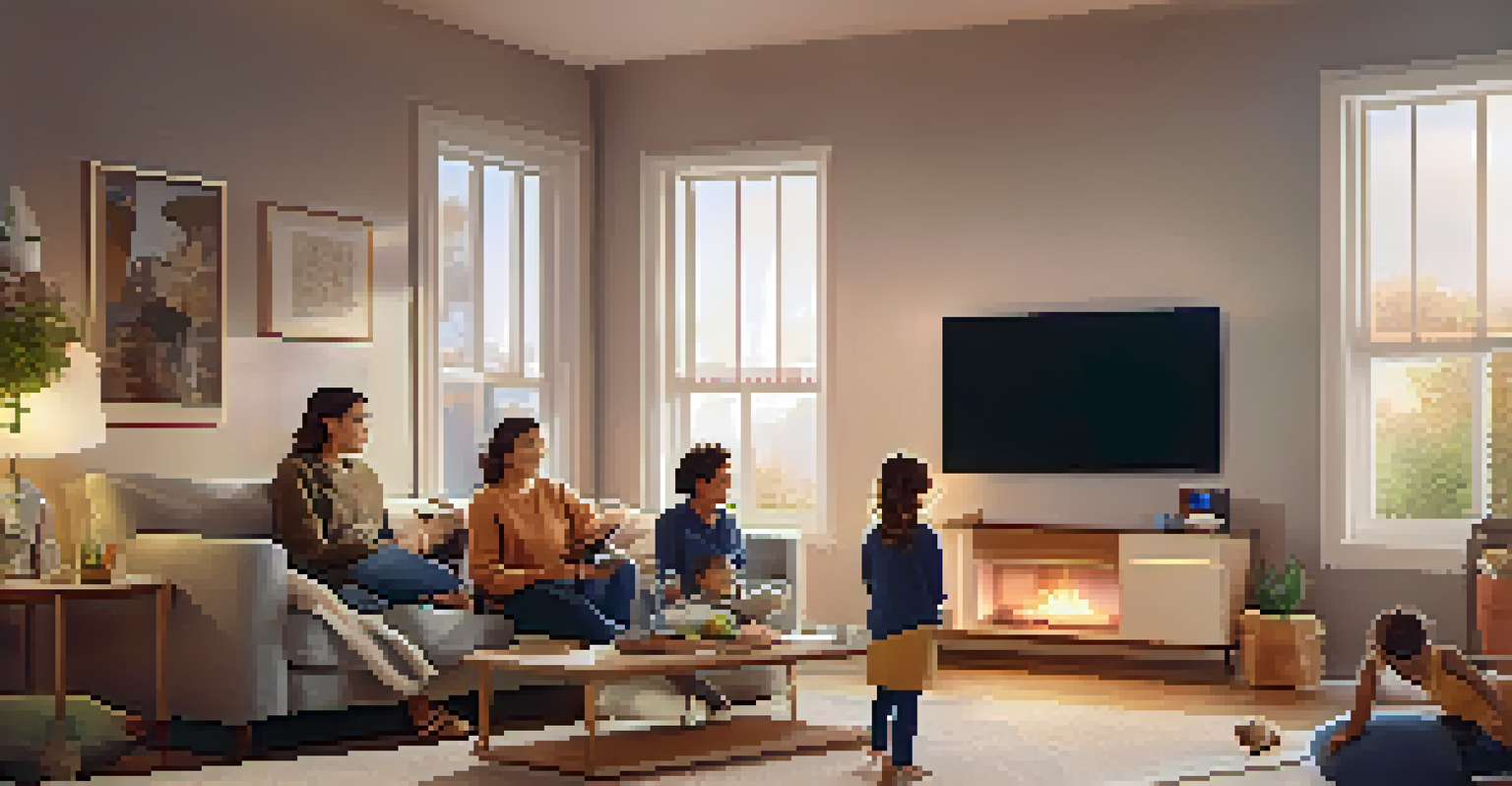The Future of Smart Housing with IoT Technology

Understanding Smart Housing and IoT Technology
Smart housing refers to homes equipped with devices that connect to the internet, allowing homeowners to control various features remotely. This technology, known as the Internet of Things (IoT), involves a network of interconnected devices that communicate and share data. By integrating IoT, homes can enhance comfort, security, and energy efficiency, making everyday life more convenient.
The greatest innovation in the home is not technology, but the ability to make life easier and more enjoyable for people.
Imagine waking up to a home that adjusts the temperature based on your sleep patterns or automatically turns on the coffee maker as soon as your alarm goes off. This is just a glimpse of what smart housing can offer. The ability of various systems to work together seamlessly creates a living environment that adapts to your needs, improving overall quality of life.
As we explore the future of smart housing, it’s clear that IoT plays a pivotal role in this transformation. The potential for increased automation and personalization is exciting and hints at a future where our homes truly understand us.
The Role of IoT in Energy Efficiency
One of the most significant advantages of smart housing is its potential for energy efficiency. IoT devices can monitor energy usage in real-time, allowing homeowners to identify wasteful practices and optimize consumption. For instance, smart thermostats can learn your schedule and adjust heating and cooling accordingly, leading to substantial energy savings.

Picture a scenario where your home automatically dims lights when you leave a room or shuts down appliances during peak energy hours. This level of automation not only conserves energy but also reduces utility bills, making it a win-win for both the environment and your wallet. Such innovations encourage sustainable living, showing how technology can align with eco-friendly practices.
Smart Housing Enhances Daily Life
IoT technology automates mundane tasks, allowing homeowners to focus on what truly matters.
In the future, we can expect even more sophisticated energy management solutions, as IoT technology evolves. The integration of renewable energy sources, like solar panels, with smart home systems will further enhance energy efficiency and sustainability.
Enhancing Home Security with IoT Devices
Home security is a priority for many, and IoT technology offers innovative solutions to keep your home safe. From smart locks that allow remote access to security cameras that send alerts to your phone, the options available today are both practical and user-friendly. These devices enable homeowners to monitor their properties in real-time, providing peace of mind whether they are at home or away.
Sustainability is no longer about doing less harm. It's about doing more good.
Imagine receiving a notification that your door was left unlocked or being able to check your security feed from anywhere in the world. The power of IoT allows for such capabilities, making it easier than ever to protect your home and loved ones. Additionally, integrating these devices with other smart home systems can create a comprehensive security network tailored to your needs.
As technology advances, we can anticipate even smarter security solutions that incorporate artificial intelligence, learning from patterns to detect unusual activity. The future of home security will be more proactive, ensuring a safe living environment for everyone.
The Impact of Smart Housing on Daily Life
Smart housing doesn’t just enhance security and energy efficiency; it significantly impacts our daily routines. With IoT devices, mundane tasks can be automated, freeing up valuable time. For example, smart kitchen appliances can help with meal prep, while voice-activated assistants can manage schedules and reminders.
Consider how convenient it would be to control your home’s lighting, temperature, and entertainment systems with a simple voice command or a tap on your smartphone. This level of integration creates a more enjoyable living experience, enabling homeowners to focus on what truly matters—spending time with family and pursuing hobbies.
Energy Efficiency Through IoT
Smart homes optimize energy consumption, resulting in lower utility bills and promoting sustainable living.
The evolution of smart housing promises to transform our lifestyles, making homes more responsive to our needs. As we embrace these technological advancements, we can look forward to a future where our homes actively contribute to our well-being.
Challenges Facing Smart Housing Adoption
Despite the many advantages of smart housing, several challenges hinder widespread adoption. One major concern is the issue of privacy and data security. With so many devices connected, the risk of data breaches increases, making it essential for manufacturers to implement robust security measures to protect user information.
Additionally, the complexity of technology can deter some homeowners from embracing smart housing. Many people may feel overwhelmed by the number of devices available and how to integrate them effectively into their lives. Simplifying the user experience and providing clear guidance will be crucial in overcoming this barrier.
Finally, the initial investment in smart technology can be a deterrent. While the long-term savings on energy bills are appealing, the upfront costs can discourage potential buyers. Addressing these challenges is vital for the future growth of smart housing in our communities.
The Role of Smart Housing in Sustainable Living
Smart housing is not only about convenience; it also plays a crucial role in promoting sustainable living. By optimizing energy consumption and reducing waste, smart homes contribute to a healthier planet. The integration of IoT technology enables homeowners to make informed choices that minimize their environmental impact.
For instance, smart irrigation systems can monitor soil moisture levels and adjust watering schedules accordingly, conserving water in the process. Similarly, energy monitoring devices can help identify patterns that lead to unnecessary energy use, encouraging more sustainable habits. Such features align with global efforts to combat climate change and promote eco-friendly practices.
Security Innovations for Peace of Mind
IoT devices provide real-time monitoring and alerts, enhancing home security and ensuring safety.
As we move forward, the collaboration between smart housing and sustainability will grow stronger. The future will likely see more innovative solutions that not only enhance our living spaces but also foster a better relationship with the environment.
The Future Landscape of Smart Housing
Looking ahead, the landscape of smart housing will continue to evolve with advancements in IoT technology. We can expect a wave of new devices and systems that enhance the functionality of our homes. Features like predictive maintenance, where systems alert homeowners about potential issues before they become major problems, will likely become standard.
Furthermore, the integration of artificial intelligence will enable homes to learn from our habits and preferences, creating personalized environments that adapt to our lifestyles. Imagine a home that not only responds to your commands but anticipates your needs, creating a truly intuitive living experience.

As more people adopt smart housing technologies, we will see a shift in how homes are designed and built, with an emphasis on connectivity and efficiency. The future of smart housing promises to be a harmonious blend of technology and comfort, paving the way for a new era of living.